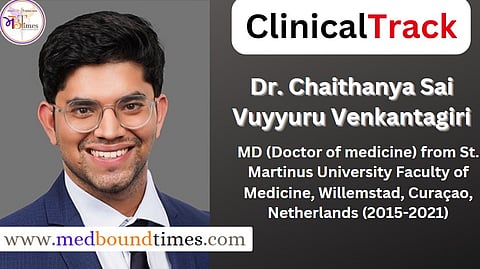ClinicalTRACK - Dr. Chaithanya Sai Vuyyuru Venkantagiri
Name: Dr. Chaithanya Sai Vuyyuru Venkantagiri
Birth Place: Andhra Pradesh, India
Academic Qualification: MD (Doctor of medicine) from St. Martinus University Faculty of Medicine, Willemstad, Curaçao, Netherlands (2015-2021)
Languages: English, Telugu, Hindi and Tamil
What Are You Doing Currently?
I am applying for this year's match cycle in the US.
How Was Your Initial Experience with Clinical Initiation, Clinical Rotations, or Bedside Learning?
It’s more like team-based learning, and learning how to evaluate patients. I would say it’s thrilling and an adrenaline rush.
Can You Share Some Humorous, Peculiar, or Unforgettable Experiences You've Had While Working in a Clinical Ward?
Certainly. While I was doing psychiatry in-patient rotation, I was with my attending in a room when he was evaluating a male patient. For some time, it was going smoothly, but suddenly the patient got up from his chair and punched the attending so hard that security had to come to tackle him. It was a very horrific situation and unforgettable for me.
What Are Your Thoughts on Outpatient Clinics (OPD) as an Integral Part of the Medical Profession?
find OPD enjoyable, as I like to talk more to the patients and help them tackle health conditions before they get worse.
What Are Your Thoughts on Indoor/Ward/Floor Duties in a Hospital?
Inpatient wards are challenging because you never know what might happen. You have to constantly check up on patients. I appreciate nurses and staff for their dedication to patients' recovery. The challenging part is when patients come with conditions that are difficult to diagnose, but these challenges motivate me to work harder for the patients.
Could You Describe Your Routine and Activities When You Are Rounding on Patients During Your Medical Duties?
I like to gather as much information as possible about the patient before my attending comes for rounds. Being well-prepared ensures efficient rounds.
What Are Some of Your Favorite Procedures or Activities That You Enjoy While Working in Hospitals or Outpatient Clinics (OPDs)?
I enjoy every procedure that I'm able to do because I imagine how the patient will feel once they get relief from the pain and discomfort they were experiencing.
What Are Some Procedures or Activities That You Dislike or Prefer to Avoid?
I don't have a specific procedure or activity that I dislike. I try to approach each task with a positive attitude.
Can You Describe Your Experience During Your Clinical Rotations?
I had a great experience during my clinical rotations. I rotated through various departments, and my favorite was Gastroenterology. This was largely due to the attending I worked with, who taught me a lot and made me feel like a doctor, not just a student on rotation.
What Are Some of the Least Favorite Aspects or Activities for You While on Duty in a Hospital?
Night shifts are not my favorite, but when they are necessary, I go through with them without compromising patient care. Being more outspoken as medical students during rotations could help us learn and improve.
If You Could Change One Aspect of How Doctors and Medical Students Work or Operate in Hospitals or Outpatient Clinics (OPDs), What Would It Be?
I believe medical students should be encouraged to be more outspoken during rotations to enhance their learning experiences.
How Do You Handle or Perceive Night Calls/Shifts?
I don't particularly like night shifts, but when necessary, I carry them out with dedication. I make sure not to let the quality of patient care suffer. In-house calls are part of the profession, and I handle them professionally.
How Do You Manage the Food Situation While You Are on Duty in the Hospital or During Your Work Shifts?
I don't complain about food. I focus on my duties and patient care.
How Do You Like to Spend Your Leisure Time When You're Not Working or on Duty?
I'm a movie buff and enjoy dancing. I also engage in various household activities to relax.
Is There Something That You Strongly Dislike or Find Challenging?
I don't have strong dislikes, but night shifts can be challenging.
If You Had the Opportunity to Choose an Alternative Specialty, Career, or Role at This Point, What Would You Switch To?
I've always had a passion for dance, but I wouldn't switch careers. I enjoy medicine and aspire to have my own practice to help people.
If You Could Choose Any Medical Institution, Place, or Destination to Work at, What Would Be Your Dream Choice?
I haven't thought about it in detail yet. My ideal workplace will align with my life's purpose and future goals.
Could You Describe Your Ideal Workplace and the Factors That Make It Desirable for You?
My ideal workplace would be one where I can make a meaningful impact on patients' lives. It should provide opportunities for continuous learning and growth. A supportive and collaborative team, as well as access to the latest medical technologies, would also be important factors for me.
(ClinicalTRACK / Dr. Chaithanya Sai Vuyyuru Venkantagiri/PB)


